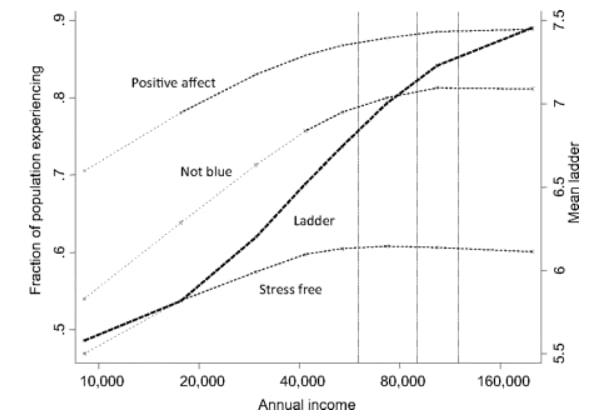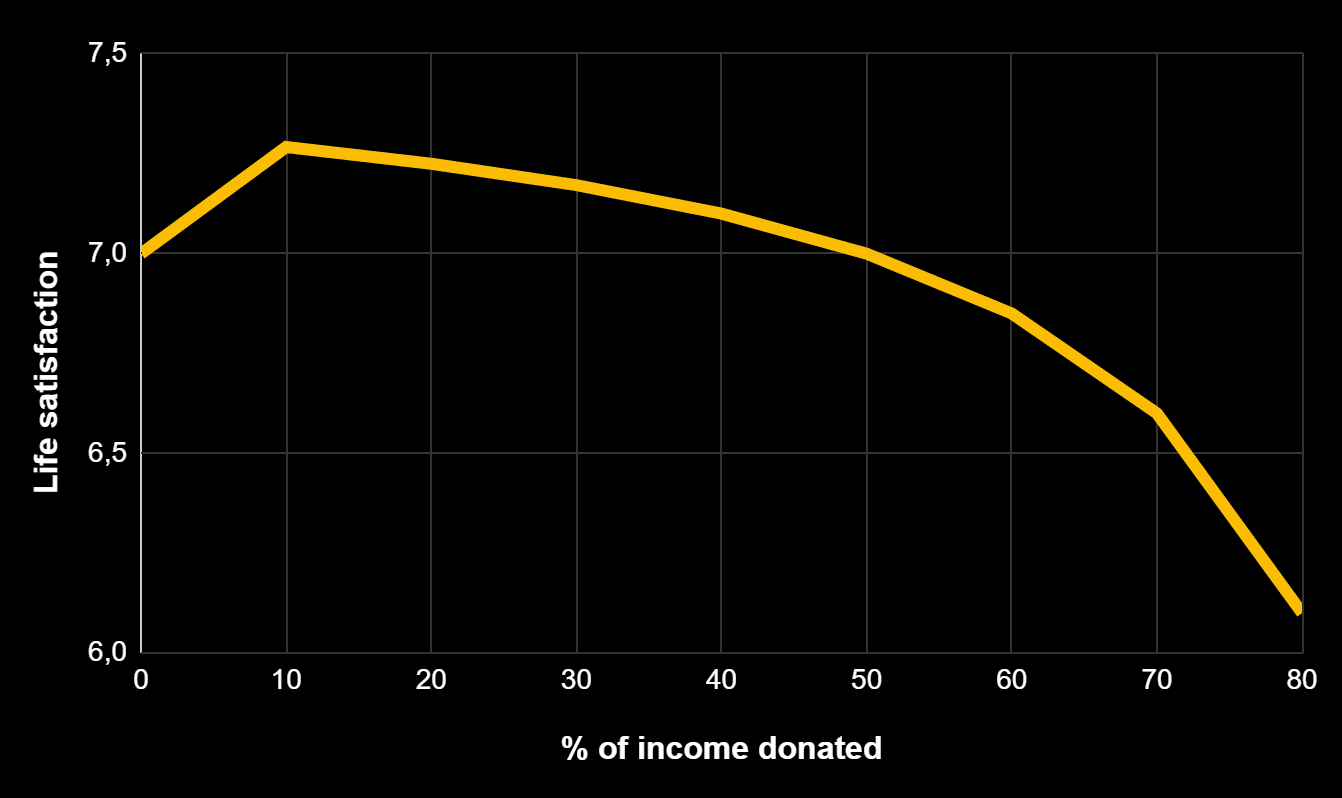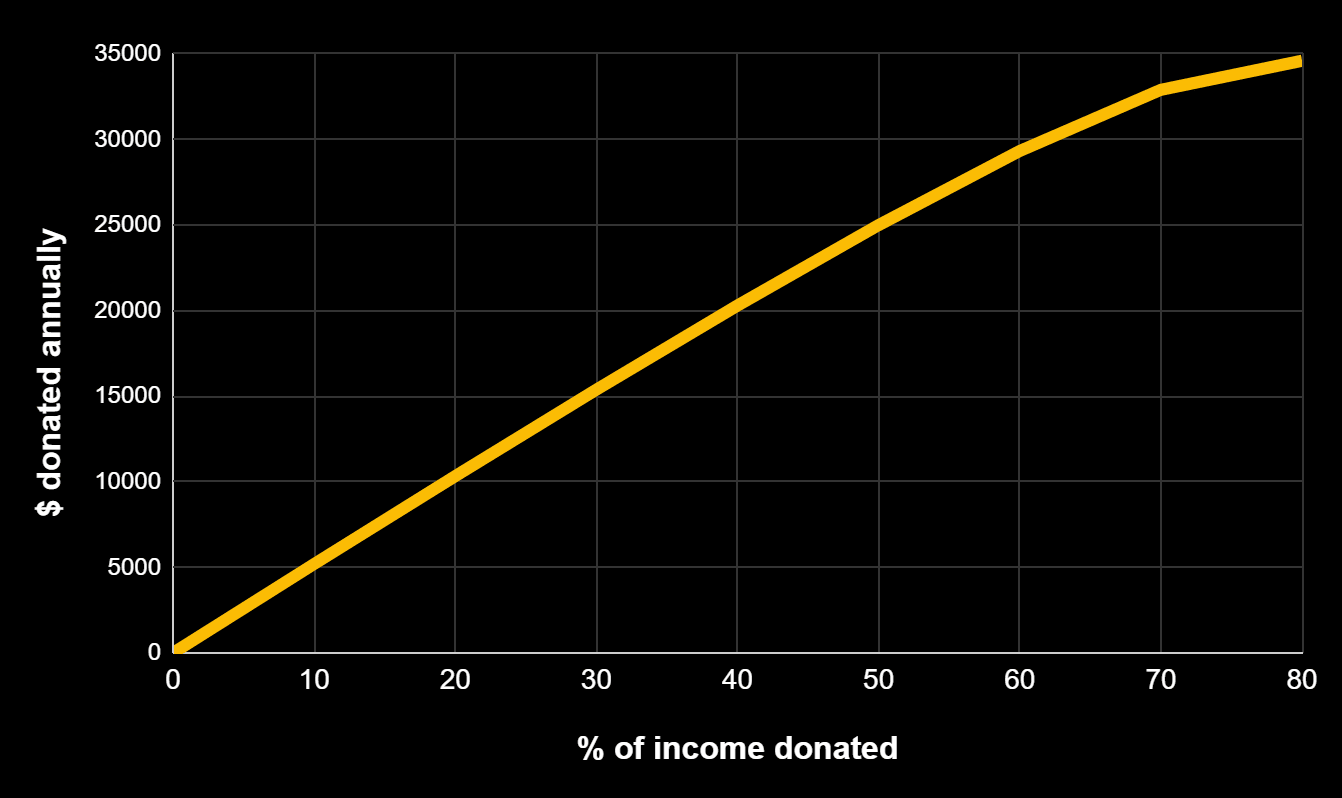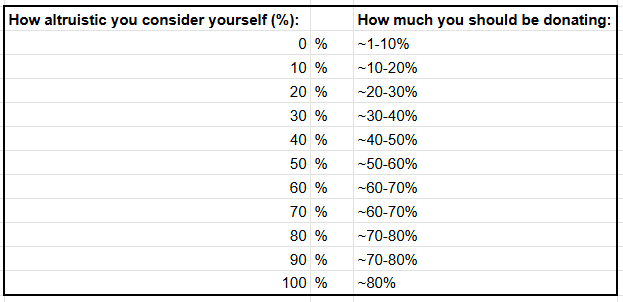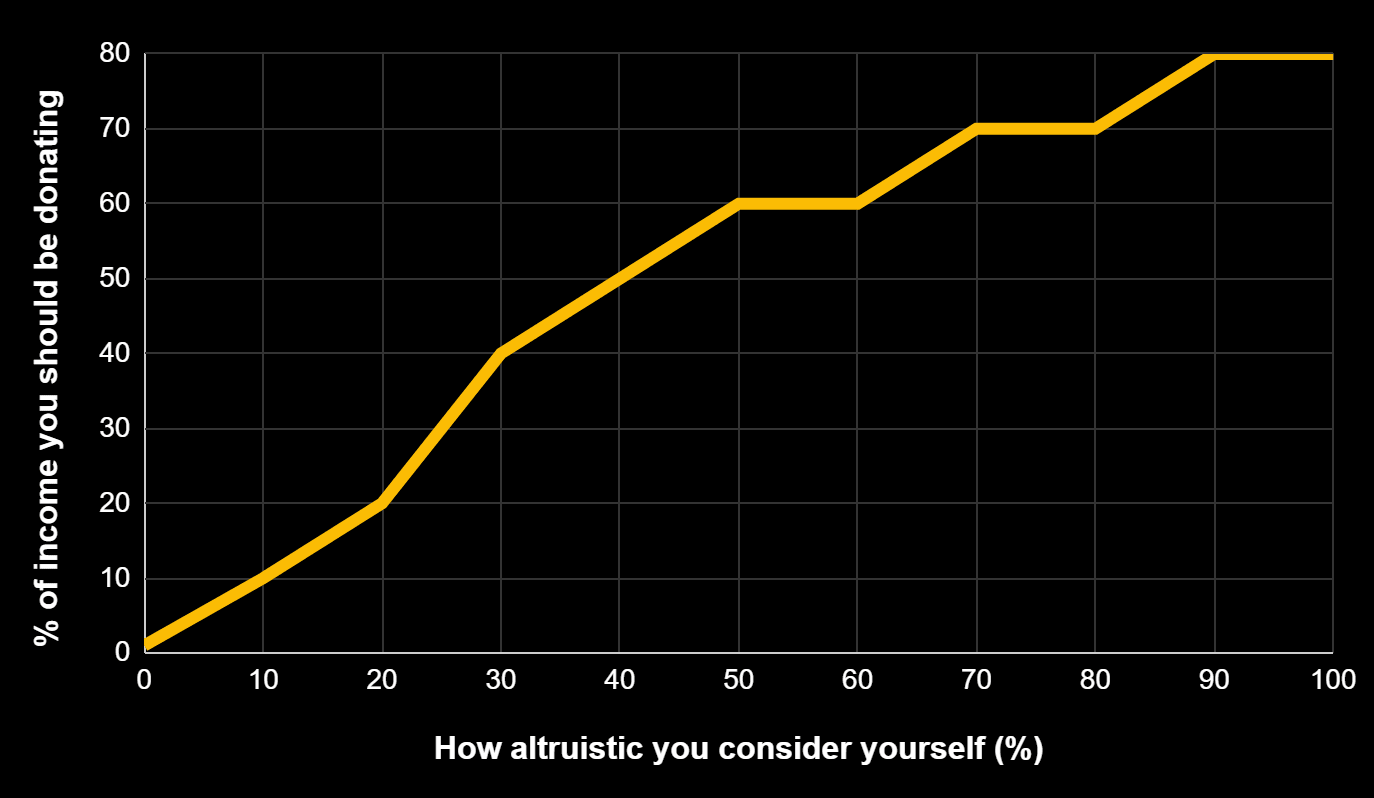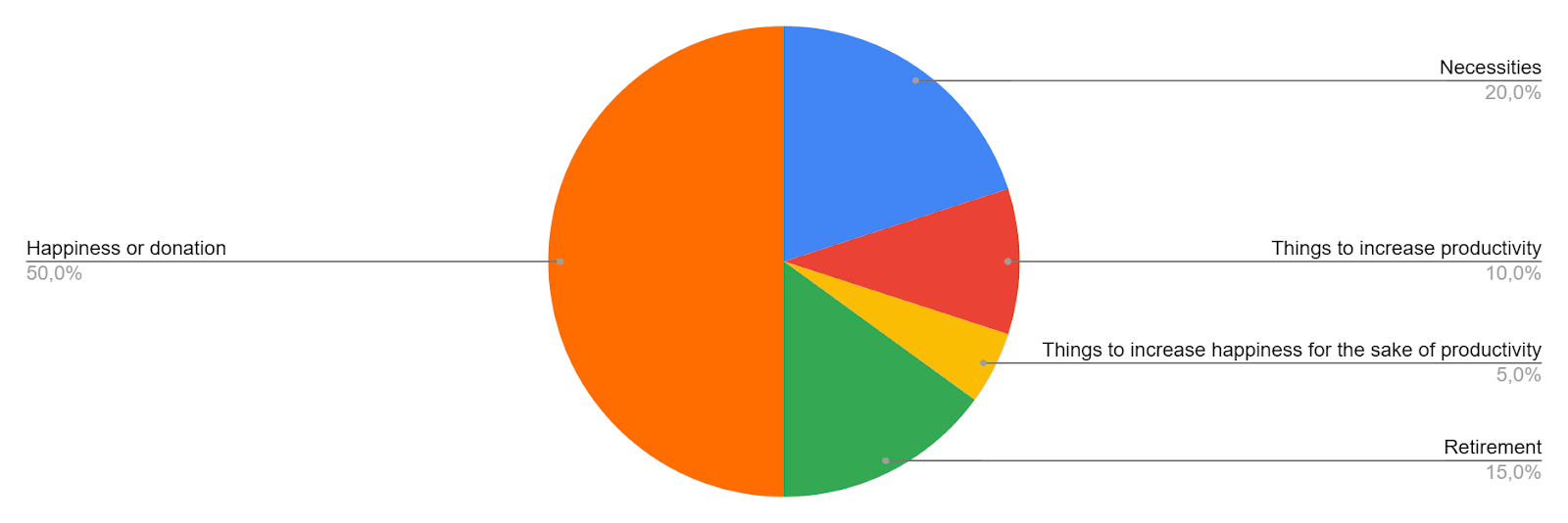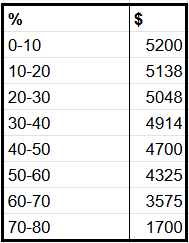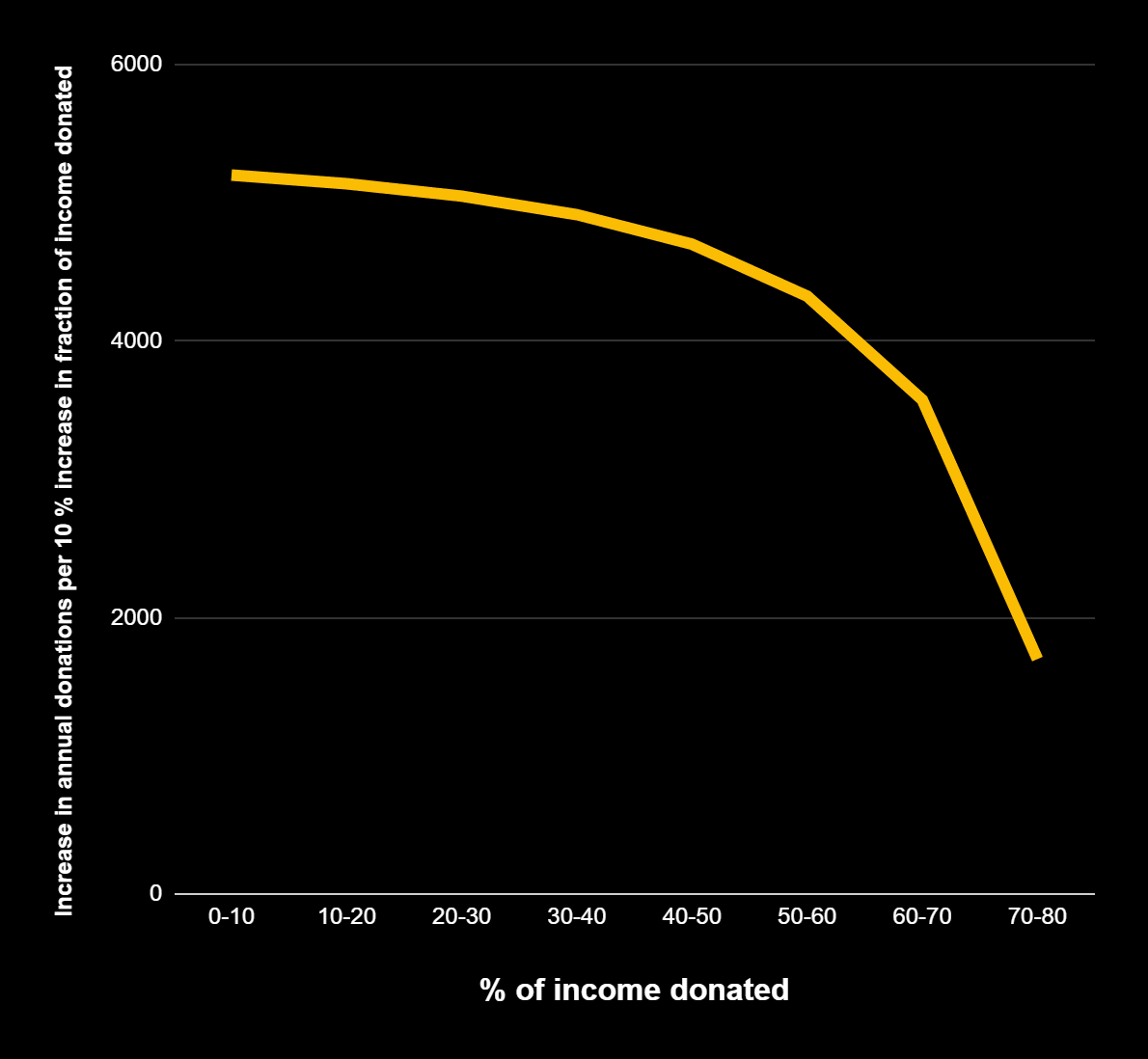How much to donate to maximize impact and personal happiness
By Jens Aslaug 🔸 @ 2025-07-31T07:40 (+16)
Summary
It seems, if your only goal is to maximize your positive impact on the world, you should still prioritize using some amount of money to increase your own happiness. This is because happier people are more productive. On the other hand, if you only wanna maximize your own personal happiness, you should still prioritize using some of your money for donations. Since helping others and donating money has been linked to higher life satisfaction.
While most people reading this put a very high weight on maximizing their positive impact, most of us ain’t 100 % altruistic, and thus would land somewhere in between these two boats. By choosing how altruistic you want to be (e.g. 50%) and using existing data on the correlation between happiness and donating, you can estimate the ideal amount of money you should be donating.
Introduction/purpose
I recently graduated my master’s degree in odontology (dentistry). Something I, from the very beginning, had decided to study for the sake of doing earning to give. On the day of my graduation I signed my GWWC pledge, pledging to donate a minimum of 50 % of my lifetime post tax income. I chose this amount because I thought it was a large amount, yet something that was realistic for me to achieve. Though I was/am hoping to donate slightly more than this.
I do believe total utilitarianism is the most ideal moral philosophy, and maximizing my own positive impact in expectation, is my main focus in life. Though it’s not my only. I work less hours and donate less money than what would be considered ideal from a utilitarian perspective. This is not an accident, it's a conscious choice of mine. I’m not 100% altruistic and I don’t really wanna be. I don't really have a rational argument for choosing this, all I can say is I’m not 100% altruistic and I don’t feel bad about it. (Though I would say, if I were trying to live completely according to utilitarianism, my risk of burnout would be higher, even though I would consciously try to avoid it.) I would say I prioritize something like this: ~70% altruism and ~30% personal happiness.
Though now comes the question - “how much should I be donating to maximize both”? Weirdly enough, I didn’t find many EA-related writings on this topic, and none that seeks to answer it directly. Most of us either know or have the intuitive idea that - earning more tends to increase happiness, but with diminishing returns. On the other hand, donating more (unless you're earning an exceptionally high income) has a roughly linear relationship with the positive impact you can have through your giving. But where’s the sweet spot?... Well, with a combination of a little research, my own intuition and some made up formulas, I’ll give my best educated guess.
Risk of bias (and other things that decreases the validity of my analysis)
Here’s a list of biases or other factors that might cause this analysis to be inaccurate:
- Most of the numbers used are made up from my gut feeling.
- This was written within a relatively short time period and most sources sighted are once I knew off the top of my head. Or said in another way - I only spend a short amount of time doing research.
- This post was made by a single author.
- I care more about EA’s total impact than the happiness of our members (though I care about both and minimizing risk of burnout is also important for impact).
- I don’t have any qualifications except - doing earning to give and being a bit nerdy in the area of finance.
- My brain might subconsciously be trying to find rational reasons for doing what seems to be normal for most people - spend more money, including on things I rationally know has no correlation with long term happiness.
I generally think a much better version of a similar writing could be made by someone more qualified or willing to spend more time on it.
(Note - please let me know if you think anything needs correction in any way)
If you only wanna maximize impact
Even if your only goal in life is to maximize your positive impact, donating all of your money is obviously not possible. You’ll need to spend money on things that’s realistically necessary to keep a job like: food, accommodation, medicine etc. On top of that, there’ll properly be certain “investments” that will be worth your money, do to the increase in productivity: e.g. a bike/car to more quickly get to work or pre-made food (e.g. Huel or Jimmy Joy). Though even if you don’t care about your personal happiness, neglecting it completely isn’t a good strategy. Prioritizing your own well-being, for the sake of being able to keep your productivity high and avoiding burn out, isn’t a new idea for most EAs. Though happiness itself also seems to be strongly correlated with productivity.
A meta-analysis by Lyubomirsky et al. (2005) examined the relationship between positive affect (the degree to which a person experiences positive emotions) and various life outcomes. The researchers grouped findings from multiple studies into categories such as sociability, health, and worklife. Within each category, they calculated average results to compare individuals with higher versus lower levels of positive affect. Below are a few of their findings:
Based on cross-sectional correlational literature, having more positive affect improved:
- Worklife (mean r= .27)
- More creative as well as more efficient problem solvers (mean r= .26) (*less conclusive)
- Good coping with distress (mean r= .34)
- Sociability and activity (mean r= .33)
- Popularity (mean r= .31)
- Positive construals of self and other (mean r= .39)
- Superior conflict resolution skills (mean r= .23) (*less conclusive)
- Health (mean r= .32)
- Immune functioning (mean r= .33)
r = effect size
This is of course only correlational data. The meta-analysis however also showcases some longitudinal literature which indicates that happiness precedes success. These types of studies are much less extensive, yet still impressive in the robustness and consistency of their results. Here are some of their results:
- Fulfilling and productive work (mean r= .24)
- Satisfying relationships (mean r= .21)
- Superior mental and physical health and longevity (mean r= .18)
- Physical well-being and adaptive coping (mean r= .27)
r = effect size
Overall, the meta-analysis concludes that the evidence supports a two-way relationship: success can lead to happiness, but happiness also appears to lead to success. This reinforces the idea that prioritizing your own happiness is not just personally beneficial — it also enhances productivity, improves social interactions, and supports both physical and mental health. All of which can help increase your earning potential — and ultimately, your ability to donate more.
(Note the concept that happiness leads to success is also well described in my favorite book on personal development: “The Happiness Advantage”. For anyone interested here’s a video summery.)
If you only wanna maximize personal happiness
(Then I don’t know what you’re doing here lol)
There is a correlation between earning more and subjective wellbeing, however it has diminishing returns. One study found that roughly, each time you double your pretax income, there is a mean increase in subjective life satisfaction of 0.5 on a scale from 1-10 (see fig 1). Whether or not the real increase in life satisfaction is more or less than this is up for debate. I think 80k does a good job at debating this, but here’s my summary:
Arguments that life satisfaction may increase faster than this with the rise in income:
- Many people in the survey reported (nearly) maximum happiness scores, this could have caused a flattening of the curve despite actual increases in happiness.
Arguments that life satisfaction may increase slower than this with the rise in income:
- “Positive affect” (whether people reported feeling happy yesterday) line goes flat around $50,000 (~$74,000 adjusted for inflation) of pretax household income, showing that beyond this point, income had no relationship with day-to-day happiness in this survey.
- “Not blue” (1 minus the average of the percentage reporting sadness and worry) or “stress free” yesterday, these lines are completely flat by $90,000 (~$132,000 adjusted for inflation) of household income.
- Correlation isn’t causation. Also it could easily be the other way around - that being happier makes you more productive, making you earn more (as I have argued for earlier).
Another study also somewhat similarly found that higher income leads to higher subjective well-being, however almost no difference in current happiness.
Another consideration - the average person isn't very good at “converting” money to happiness (as I’ll argue for later). Therefore if you're spending your money more efficiently, how strong the correlation is could be significantly different. This argument can go both ways, since on one hand you can save money on things that have a weak correlation with happiness, so you might not need as much money. On the other hand, since you’re better at converting money to happiness, the correlation might be stronger for you.
Overall, I think the real, long-term increase in life satisfaction, the average person will have by doubling their pre-tax income, is lower than the 0.5. My intuition / gut feeling would say that it’s very roughly 0.3, which is what I’ll be using for my own calculation later. Though at least based on this survey, it does seem that this number is even lower when you reach above a household income of $90,000 (~$132,000 adjusted for inflation).
Fig. 1 Graph showing the corralation between annual household income and different measurements related to life quality; Ladder = subjective life satisfaction from a scale from 1-10; Positive affect = whether people reported feeling happy yesterday; Not blue = 1 minus the average of the percentage reporting sadness and worry; stress free = whether people reported feeling stress free yesterday;
Note semi-log plot; The graph is from 2010, so if you wanna adjusted for inflation $1 is ~1.47;
But back to donations - while some people might think you shouldn’t donate if you only care about your own happiness, this doesn’t really seem to be true. As most of you know, donating money or “doing good” in general can be very rewarding. A global survey found that people who donate to charity are as satisfied with their lives as those who earn twice as much. While this is only correlation, the evidence that helping others makes yourself happier is strong. So yes, for the majority of the population, donating more money would be a win-win situation. :)
In terms of how much to donate, I couldn't find any research on this topic during the short time I spent making this writing. The closest I got was one study saying that there was no difference between using $5 or $20 on prosocial spending (spending money on others). While this might be pretty far from our question, it does follow the general rule that humans are bad at understanding the size of numbers (scope Insensitivity).
My best educated guess is that donating more money increases happiness more, but only very slightly and with severely diminishing returns. However, I think donating more frequently is optimal for happiness, (somewhat) similar to how doing more frequent prosocial acts has been linked to better wellbeing.
How to most effectively increase happiness with money
I won't spend too much time on this, mainly because I think there’s already pretty good resources on this topic. But here’s some of the most important findings from the article: “If Money Doesn't Make You Happy Then You Probably Aren't Spending It Right”:
- Principle 1: Buy experiences instead of things - Spending money on material goods only gives a short term boost in happiness. Your brain quickly gets used to the change and goes back to your baseline happiness - aka hedonic adaptation.
- Principle 2: Help others Instead of yourself - One study showed that personal spending was unrelated to happiness, people who devoted more money to prosocial (gifts for others, and donations to charity) were happier, even after controlling for their income.
- Principle 3: Buy many small pleasures instead of few big ones - across many different domains, happiness is more strongly associated with the frequency than the intensity of people’s positive affective experiences.
- Principle 4: Buy less insurance - If the bad news is that we adapt to good things, the good news is that we adapt to bad things as well.
- Principle 5: Pay now and consume later - consume now, pay later is a bad idea: it eliminates anticipation. The person who buys a cookie and eats it right away may get X units of pleasure from it, but the person who saves the cookie until later gets X units of pleasure when it is eventually eaten plus all the additional pleasure of looking forward to the event.
- Principle 6: Think About What You’re Not Thinking About - when making a purchase, thinking about how it actually will change your day to day life (both the good and the bad), will help you get a more realistic estimation on how the purchase will impact your happiness. E.g. when imagining buying a vacation home, many don’t think about the mosquitos, potential plumbing disaster or long weekend commute.
Two videos I suggest everyone to watch:
- A Summary of the article: https://www.youtube.com/watch?v=wsT2bBo4XT8&t=1s&ab_channel=AliAbdaal
- Investing in Happiness: https://www.youtube.com/watch?v=iNZk-N6uDcg&t=3s&ab_channel=BenFelix
How to find your sweet spot
(Aka time for math, made up graphs and other fun stuff :D)
(Note - you can play around with the numbers by downloading the google sheets file. Though I’m not sure how user friendly it is. I just made it pretty quickly, in a way that made sense in my head.)
Correlation between amount donated and happiness
Assuming the following 3 things, we can make a graph on how donating a percentage of your income influences your happiness:
- Having half your current income decreases your life satisfaction by 0.3 (on a scale from 1-10);
- Your base line life satisfaction is 7.0;
- Donating any amount of money increases your life satisfaction by 0.3 (note this is based on the Correlation that donating money increases your happiness as much as earning twice as much)
Fig. 2 Showing my very rough estimation of the correlation between the fraction of posttax money donated and life satisfaction.
Based on this graph we can see:
- Donating 0-50%: will make you happier than not donating
- Donating >50%: will make you less happy than not donating
Happiness impact on productivity
As I have argued earlier, higher income increases your happiness and being more happy increases your productivity/your income potential and therefore how much you can donate. Well since your happiness will start to decrease the more you donate, this will thus decrease the money you’ll be able to earn. So we can make a graph based on:
- Your posttax annual earnings are $50k at baseline happiness.
- Your income increases/decreases by 15% for every 1 point increase/decrese in life satisfaction from the baseline.
- Life satisfaction based on how much you donate, is calculated in the same way as in the previous graph.
Fig. 3 The correlation between the fraction of posttax money donated and annual money donated, when taking into account how donating more impacts your happiness and thus productivity/earnings.
Based on this graph we can see:
- 0-60%: There’s an almost linear increase in money donated with the increase in the fraction of money donated (e.g. from 0% to 10% the increase is $5.200 and from 50% to 60% the increase is ~$4.300).
- 60-80%: The increase in money donated slows down with the increase in fraction of money donated (from 60% to 70% the increase is ~$3.600, but from 70% to 80% the increase is only ~$1.700).
(See more graphs in appendix)
The sweet spot
If you first try to think about how important altruism contra personal happiness is for you, in terms of percent - e.g. if it’s equally important it would be 50/50%. Now, let’s say that if you consider yourself 50% altruistic, then boosting your life satisfaction by 2 points (on a 1–10 scale) would matter to you just as much as doubling your donations. So now, to find the sweet spot, we should find the percent of money donated, where adding x1 to x2 is highest:
x1= (1*(“How altruistic you consider yourself”/100))*”Fraction donated of baseline income”
x2=((1-”How altruistic you consider yourself”/100)/2)*”Δ in happiness from baseline”
On a table and graph it would look like this:
Table 1. How big of a fraction of your post tax income you should be donating, based on how altruistic you wanna be.
Fig. 4 How big of a fraction of your post tax income you should be donating, based on how altruistic you wanna be.
Based on this graph we can see:
- 0-50% altruistic: How much you should be donating increases pretty linear.
- 50%-100%: The graph starts to flatten.
(Note - I understand there’s a better mathematical way to calculate this - I simply did it manually in 10% increments for “how altruistic”, and rounded off to the closest 10% in terms of “how much to donate”. Since all of these numbers are only a very rough estimation that should be taken with a huge grain of salt - I thought doing it this way was acceptable.)
Consider working less hours
I suspect the fraction of how much one should be donating—based on how altruistic they consider themselves—is higher than many might expect. While this may be due to the made up numbers I used being incorrect, I think a large part of the explanation is that money isn’t that strongly correlated with happiness anyway. So maybe a better strategy if you wanna increase your own happiness, is to decrease the number of hours you're working. Which have been shown in studies to increase life satisfaction. So assuming my made-up numbers are roughly accurate, the suggested donation amounts only make sense if you're working approximately the average number of hours. If you choose to work fewer hours to improve your happiness, it would likely make sense to donate less than what the table suggests.
Another way to find the sweet spot
(Note - this is largely inspired by the following post)
Calculating the “sweet spot” based on my made up formulas, that’s largely based on numbers I came up with using weak data and my gut feeling, is obviously only something that can be used as a very rough guide. On top of that it also ignores individual factors such as personality (like having a more expensive or frugal taste), whether you have high or low income and whether you live in an expensive city or a cheap rural area. I therefore only consider table x as a supporting tool that can’t stand alone. So in addition, it's a good idea to make different budgets, to see how donating different amounts of money would look in real life.
Before donating any significant amount of money, it’s a good idea to have a personal runway. But even then, there’s still things that should be prioritized before donating, such as - necessities, things that help you be more productive, (cheap) things to make you happier just for the sake of increasing your productivity and saving for retirement. Then the rest of the money, you can decide how much of it you wanna donate and how much you wanna use for “personal happiness”. It can be shown in a formula like this:
x = “post tax earnings” - (“necessities” + “things to increase productivity” + “things to increase happiness for the sake of productivity” + “retirement”)
“x” is then the money left that can be used for donating or personal happiness.
E.g.
Fig. 5 An example of how to think about your money. Numbers should be specific to your situation (needs, income etc.).
Practical recommendations
Whether you use these two ways to help guide you or not, I have some practical recommendations, that I think everyone should consider:
- Even if you only care about donating as much as possible, you should still spend some money to help increase your own happiness. This amount should be a smaller fraction of your total post tax income, the more you earn. But the total amount should be higher the more you earn. (This is because money has a diminishing return on happiness (and thus productivity), but the more you earn, the bigger return you’ll get from investing in your productivity/happiness.)
- The increase in happiness with the increase in income seems to slow significantly after a household income of $132,000. Therefore, unless you’re extremely rich or prioritize your own happiness very highly, it will probably make sense to donate at least everything above this amount.
- If you wanna increase your personal happiness, decreasing your working hours may be a better strategy than keeping a higher total sum of money to yourself.
- Donating smaller amounts with a higher frequency, may be more ideal for happiness than donating higher amounts less frequently.
- Even when having very low income (e.g. being a student), it might make sense to still donate a (very) small amount of money each month to increase your own happiness and stay engaged with EA.
- You shouldn’t be donating large amounts of money before you have built up your personal runway.
- Aim to maximize the happiness you derive from spending - e.g. prosocial spending instead of buying material things.
- While I do think it’s good to be ambitious, I do think it’s better to donate 10 percentage points less, than being at risk of burn out.
How I plan to use this data myself (for those interested)
So far, I’ve worked only 3-4 days a week (due to personal reasons), for a little less than a year. I expect the following numbers when this first year of work is over:
- Total post tax earnings: ~60k $ (this includes receiving 10k from a savings account)
- Total donated: ~20k $
- % of post tax income donated: ~33%
Like I said earlier, I consider myself ~70% altruistic - which according to my calculations would mean that I should be donating ~60-70%, far from what I’m donating now. My donations have been pretty low this year, due to having lower income than I expect in the future, and due to saving up for my personal runway. I do plan to donate more in the future.
To increase my happiness (and for personal reasons) I only plan to work 4-days a week. But even though I will probably have a higher income than most (maybe like ~80-85k post tax in a few years), my plan is still only to aim for 60 %. And while I do like to have the aim of 60% and having a budget, the reality is, if I consider something to be worth my money, I’ll buy it. I keep the budget, and the aim of 60% in the back of my mind, but at the end of the day, I don’t have it ruling my life.
-----------------------------------------------------------------------
Appendix
Table and graph showing the increase in total annual money donated, with the increase in the fraction of money donated:
Table 2. Total increase in annual money donated, per 10% incremental increase in the fraction of posttax money donated
Fig. 6 Graf showing total increase in annual money donated, per 10% incremental increase in the fraction of posttax money donated.
Clara Torres Latorre 🔶️ @ 2025-07-31T13:10 (+2)
How are you including necessities in the model? I imagine there are going to be sharp drops in happiness / earnings capacity once you cannot pay rent+utilities and I imagine they will radically change how the graphs should look like for higher %s of donations.
Jens Aslaug 🔸 @ 2025-07-31T13:47 (+1)
Well I totally agree with you, and the simple answer is - I don't. All of the graph/tables I made (except fig. 5 - which was only a completely made up example) are based on averages (including made up numbers that's supposed to represent the average). They don't take into account personal factors - like your income or how expensive rent+utilities are in your area. Therefore the models should only be used as a very rough guide, that can't work by itself (I guess one could make a more complex model that includes these factors). Therefore one should also make a budget, to see how it would look in real life, as I suggested in this section.
idea21 @ 2025-07-31T13:56 (+1)
Magnificent work on the motivation for altruistic action. If there is no motivation, there is no action, then the analysis of motivation should be a fundamental issue in any utilitarian approach. But this issue is apparently overlooked because it is taken for granted: instead of increasing the basis for motivation, the emphasis is on how to take advantage of existing motivation, regardless of its psychological origin and how to increase it.
I do believe total utilitarianism is the most ideal moral philosophy, and maximizing my own positive impact in expectation, is my main focus in life
Great. But by opposing altruistic action to happiness, we are overlooking the implications that both altruistic motivation at a given moment and what could be a strategy to increase that motivation (and thus a plausible increase in action) can have for the subjective experience of the altruistic agent.
if I were trying to live completely according to utilitarianism, my risk of burnout would be higher, even though I would consciously try to avoid it.
Are there strategies for psychological change that can simultaneously increase altruistic motivation and happiness?
I believe that in history we have approximate precedents for organized altruistic behaviors that, within the framework of subcultures practicing virtue, also facilitated subjective experiences of "fulfillment" that were attractive to a significant number of individuals. During the Middle Ages, monks and nuns comprised more than 1% of the population in Western Europe. Obviously, I'm not making an exact equivalence between these types of behaviors (secular altruism today and religious altruism then), but there is an important commonality: we are all human beings, we choose unconventional behavior, altruism plays a fundamental part in economic life, there is a shared ideological basis in a community... and we aspire to happiness... which can be achieved through many paths.
From a utilitarian perspective, a "monasticism of Effective Altruism" (whatever specific subcultural form it took), if it reached 1% of the population, would have an unimaginable impact on alleviating avoidable suffering worldwide.
Isn't the matter even worth discussing?
What is the current percentage of people capable of making an altruistic commitment like Jens´ relative to the population of Western Europe alone? Is it increasing?
